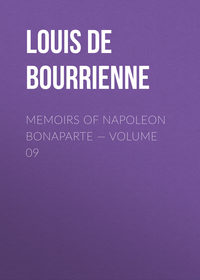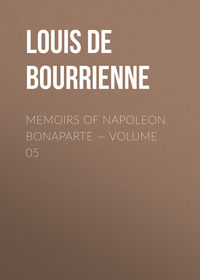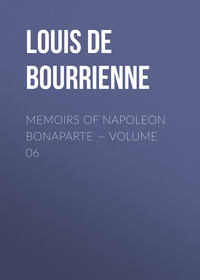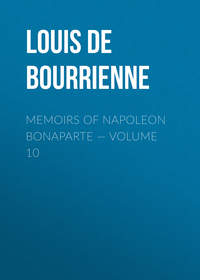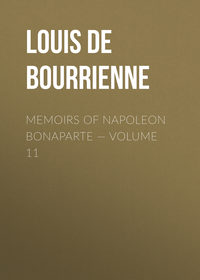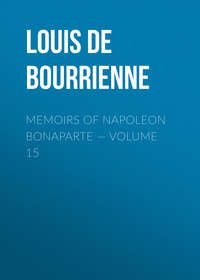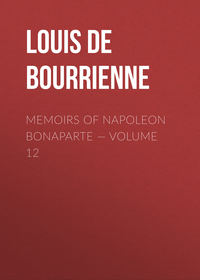 полная версия
полная версияMemoirs of Napoleon Bonaparte — Volume 08
—ceased as if by enchantment. The flotilla entered the port safe and sound and he went back to the camp, where the sports and amusements prepared for the soldiers commenced, and in the evening the brilliant fireworks which were let off rose in a luminous column, which was distinctly seen from the English coast.—[It appears that Napoleon was so well able to cover up this fiasco that not even Bourrienne ever heard the true story. D.W.]
When he reviewed the troops he asked the officers, and often the soldiers, in what battles they had been engaged, and to those who had received serious wounds he gave the cross. Here, I think, I may appropriately mention a singular piece of charlatanism to which the Emperor had recourse, and which powerfully contributed to augment the enthusiasm of his troops. He would say to one of his aides decamp, "Ascertain from the colonel of such a regiment whether he has in his corps a man who has served in the campaigns of Italy or the campaigns of Egypt. Ascertain his name, where he was born, the particulars of his family, and what he has done. Learn his number in the ranks, and to what company he belongs, and furnish me with the information."
On the day of the review Bonaparte, at a single glance, could perceive the man who had been described to him. He would go up to him as if he recognised him, address him by his name, and say, "Oh! so you are here! You area brave fellow—I saw you at Aboukir—how is your old father? What! have you not got the Cross? Stay, I will give it you." Then the delighted soldiers would say to each other, "You see the Emperor knows us all; he knows our families; he knows where we have served." What a stimulus was this to soldiers, whom he succeeded in persuading that they would all some time or other become Marshals of the Empire!
Lauriston told me, amongst other anecdotes relating to Napoleon's sojourn at the camp at Boulogne, a remarkable instance of intrepidity on the part of two English sailors. These men had been prisoners at Verdun, which was the most considerable depot of English prisoners in France at the rupture of the peace of Amiens. They effected their escape from Verdun, and arrived at Boulogne without having been discovered on the road, notwithstanding the vigilance with which all the English were watched They remained at Boulogne for some time, destitute of money, and without being able to effect their escape. They had no hope of getting aboard a boat, on account of the strict watch that was kept upon vessels of every kind. These two sailors made a boat of little pieces of wood, which they put together as well as they could, having no other tools than their knives. They covered it with a piece of sail-cloth. It was only three or four feet wide, and not much longer, and was so light that a man could easily carry it on his shoulders,—so powerful a passion is the love of home and liberty! Sure of being shot if they were discovered, almost equally sure of being drowned if they effected their escape, they, nevertheless, resolved to attempt crossing the Channel in their fragile skiff. Perceiving an English frigate within sight of the coast, they pushed off and endeavoured to reach her. They had not gone a hundred toises from the shore when they were perceived by the custom-house officers, who set out in pursuit of them, and brought them back again. The news of this adventure spread through the camp, where the extraordinary courage of the two sailors was the subject of general remark. The circumstance reached the Emperor's ears. He wished to see the men, and they were conducted to his presence, along with their little boat. Napoleon, whose imagination was struck by everything extraordinary, could not conceal his surprise at so bold a project, undertaken with such feeble means of execution. "Is it really true," said the Emperor to them, "that you thought of crossing the sea in this?"—"Sire," said they, "if you doubt it, give us leave to go, and you shall see us depart."—"I will. You are bold and enterprising men—I admire courage wherever I meet it. But you shall not hazard your lives. You are at liberty; and more than that, I will cause you to be put on board an English ship. When you return to London tell how I esteem brave men, even when they are my enemies." Rapp, who with Lauriaton, Duroc, and many others were present at this scene, were not a little astonished at the Emperor's generosity. If the men had not been brought before him, they would have been shot as spies, instead of which they obtained their liberty, and Napoleon gave several pieces of gold to each. This circumstance was one of those which made the strongest impression on Napoleon, and he recollected it when at St. Helena, in one of his conversations with M. de Las Casas.
No man was ever so fond of contrasts as Bonaparte. He liked, above everything, to direct the affairs of war whilst seated in his easy chair, in the cabinet of St. Cloud, and to dictate in the camp his decrees relative to civil administration. Thus, at the camp of Boulogne, he founded the decennial premiums, the first distribution of which he intended should take place five years afterwards, on the anniversary of the 18th Brumaire, which was an innocent compliment to the date of the foundation of the Consular Republic. This measure also seemed to promise to the Republican calendar a longevity which it did not attain. All these little circumstances passed unobserved; but Bonaparte had so often developed to me his theory of the art of deceiving mankind that I knew their true value. It was likewise at the camp of Boulogne that, by a decree emanating from his individual will, he destroyed the noblest institution of the Republic, the Polytechnic School, by converting it into a purely military academy. He knew that in that sanctuary of high study a Republican spirit was fostered; and whilst I was with him he had often told me it was necessary that all schools, colleges, and establishments for public instruction should be subject to military discipline. I frequently endeavoured to controvert this idea, but without success.
It was arranged that Josephine and the Emperor should meet in Belgium. He proceeded thither from the camp of Boulogne, to the astonishment of those who believed that the moment for the invasion of England had at length arrived. He joined the Empress at the Palace of Lacken, which the Emperor had ordered to be repaired and newly furnished with great magnificence.
The Emperor continued his journey by the towns bordering on the Rhine. He stopped first in the town of Charlemagne, passed through the three bishoprics,
—[There are two or three little circumstances in connection with this journey that seem worth inserting here:
Mademoiselle Avrillion was the 'femme de chambre' of Josephine, and was constantly about her person from the time of the first Consulship to the death of the Empress in 1814. In all such matters as we shall quote from them, her memoirs seem worthy of credit. According to Mademoiselle, the Empress during her stay at Aix-la- Chapelle, drank the waters with much eagerness and some hope. As the theatre there was only supplied with some German singers who were not to Josephine's taste, she had part of a French operatic company sent to her from Paris. The amiable creole had always a most royal disregard of expense. When Bonaparte joined her, he renewed his old custom of visiting his wife now and then at her toilet, and according to Mademoiselle Avrillion, he took great interest in the subject of her dressing. She says, "It was a most extraordinary thing for us to see the man whose head was filled with such vast affairs enter into the most minute details of the female toilet and of what dresses, what robes, and what jewels the Empress should wear on such and such an occasion. One day he daubed her dress with ink because be did not like it, and wanted her to put on another. Whenever he looked into her wardrobe he was sure to throw everything topsy-turvy."
This characteristic anecdote perfectly agrees with what we have heard from other persons. When the Neapolitan Princess di——- was at the Tuileries as 'dame d'honneur' to Bonaparte's sister Caroline Murat, then Queen of Naples, on the grand occasion of the marriage with Maria Louisa, the, Princess, to her astonishment, saw the Emperor go up to a lady of the Court and address her thus: "This is the same gown you wore the day before yesterday! What's the meaning of this, madame? This is not right, madame!"
Josephine never gave him a similar cause of complaint, but even when he was Emperor she often made him murmur at the profusion of her expenditure under this head. The next anecdote will give some idea of the quantity of dresses which she wore for a day or so, and then gave away to her attendants, who appear to have carried on a very active trade in them.
"While we were at Mayence the Palace was literally besieged by Jews, who continually brought manufactured and other goods to show to the followers of the Court; and we had the greatest difficulty to avoid buying them. At last they proposed that we should barter with them; and when Her Majesty had given us dresses that were far too rich for us to wear ourselves, we exchanged them with the Jews for piecegoods. The robes we thus bartered did not long remain in the hands of the Jews, and there must have been a great demand for them among the belles of Mayence, for I remember a ball there at which the Empress might have seen all the ladies of a quadrille party dressed in her cast-off clothes.—I even saw German Princesses wearing them" (Memoires de Mademoiselle Avrillion).
—on his way Cologne and Coblentz, which the emigration had rendered so famous, and arrived at Mayence, where his sojourn was distinguished by the first attempt at negotiation with the Holy See, in order to induce the Pope to come to France to crown the new Emperor, and consolidate his power by supporting it with the sanction of the Church. This journey of Napoleon occupied three months, and he did not return to St. Cloud till October. Amongst the flattering addresses which the Emperor received in the course of his journey I cannot pass over unnoticed the speech of M. de la Chaise, Prefect of Arras, who said, "God made Bonaparte, and then rested." This occasioned Comte Louis de Narbonne, who was not yet attached to the Imperial system, to remark "That it would have been well had God rested a little sooner."
During the Emperor's absence a partial change took place in the Ministry. M. de Champagny succeeded M. Chaptal as Minister of the Interior. At the camp of Boulogne the pacific Joseph found himself, by his brother's wish, transformed into a warrior, and placed in command of a regiment of dragoons, which was a subject of laughter with a great number of generals. I recollect that one day Lannes, speaking to me of the circumstance in his usual downright and energetic way, said, "He had better not place him under my orders, for upon the first fault I will put the scamp under arrest."
CHAPTER XXIX
1804.
England deceived by Napoleon—Admirals Missiessy and Villeneuve— Command given to Lauriston—Napoleon's opinion of Madame de Stael— Her letters to Napoleon—Her enthusiasm converted into hatred— Bonaparte's opinion of the power of the Church—The Pope's arrival at Fontainebleau—Napoleon's first interview with Pius VII.— The Pope and the Emperor on a footing of equality—Honours rendered to the Pope—His apartments at the Tuileries—His visit to the Imperial printing office—Paternal rebuke—Effect produced in England by the Pope's presence in Paris—Preparations for Napoleon's coronation—Votes in favour of hereditary succession—Convocation of the Legislative Body—The presidents of cantons—Anecdote related by Michot the actor—Comparisons—Influence of the Coronation on the trade of Paris—The insignia of Napoleon and the insignia of Charlemagne—The Pope's mule—Anecdote of the notary Raguideau— Distribution of eagles in the Champ de Mars—Remarkable coincidence.
England was never so much deceived by Bonaparte as during the period of the encampment at Boulogne. The English really believed that an invasion was intended, and the Government exhausted itself in efforts for raising men and money to guard against the danger of being taken by surprise. Such, indeed, is the advantage always possessed by the assailant. He can choose the point on which he thinks it most convenient to act, while the party which stands on the defence, and is afraid of being attacked, is compelled to be prepared in every point. However, Napoleon, who was then in the full vigour of his genius and activity, had always his eyes fixed on objects remote from those which surrounded him, and which seemed to absorb his whole attention. Thus, during the journey of which I have spoken, the ostensible object of which was the organisation of the departments on the Rhine, he despatched two squadrons from Rochefort and Boulogne, one commanded by Missiessy, the other by Villeneuve—I shall not enter into any details about those squadrons; I shall merely mention with respect to them that, while the Emperor was still in Belgium, Lauriston paid me a sudden and unexpected visit. He was on his way to Toulon to take command of the troops which were to be embarked on Villeneuve's squadron, and he was not much pleased with the service to which he had been appointed.
Lauriston's visit was a piece of good fortune for me. We were always on friendly terms, and I received much information from him, particularly with respect to the manner in which the Emperor spent his time. "You can have no idea," said he, "how much the Emperor does, and the sort of enthusiasm which his presence excites in the army. But his anger at the contractors is greater than ever, and he has been very severe with some of them." These words of Lauriaton did not at all surprise me, for I well knew Napoleon's dislike to contractors, and all men who had mercantile transactions with the army. I have often heard him say that they were a curse and a leprosy to nations; that whatever power he might attain, he never would grant honours to any of them, and that of all aristocracies, theirs was to him the most insupportable. After his accession to the Empire the contractors were no longer the important persons they had been under the Directory, or even during the two first years of the Consulate. Bonaparte sometimes acted with them as he had before done with the Beya of Egypt, when he drew from them forced contributions.
—[Lauriston, one of Napoleon's aides de camp, who was with him at the Military School of Paris, and who had been commissioned in the artillery at the same time as Napoleon, considered that he should have had the post of Grand Ecuyer which Caulaincourt had obtained. He had complained angrily to the Emperor, and after a stormy interview was ordered to join the fleet of Villeneuve—In consequence he was at Trafalgar. On his return after Austerlitz his temporary disgrace was forgotten, and he was sent as governor to Venice. He became marshal under the Restoration.]—
I recollect another somewhat curious circumstance respecting the visit of Lauriston, who had left the Emperor and Empress at Aix-la-Chapelle. Lauriston was the best educated of the aides de camp, and Napoleon often conversed with him on such literary works as he chose to notice. "He sent for me one day," said Lauriston, "when I was on duty at the Palace of Lacken, and spoke to me of the decennial prizes, and the tragedy of 'Carion de Nisas', and a novel by Madame de Stael, which he had just read, but which I had not seen, and was therefore rather embarrassed in replying to him. Respecting Madame de Stael and her Delphine, he said some remarkable things. 'I do not like women,' he observed, 'who make men of themselves, any more than I like effeminate men. There is s proper part for every one to play in the world. What does all this flight of imagination mean? What is the result of it? Nothing. It is all sentimental metaphysics and disorder of the mind. I cannot endure that woman; for one reason, that I cannot bear women who make a set at me, and God knows how often she has tried to cajole me!'"
The words of Lauriston brought to my recollection the conversations I had often had with Bonaparte respecting Madame de Stael, of whose advances made to the First Consul, and even to the General of the Army of Italy, I had frequently been witness. Bonaparte knew nothing at first of Madame de Stael but that she was the daughter of M. Necker, a man for whom, as I have already shown, he had very little esteem. Madame de Stael had not been introduced to him, and knew nothing more of him than what fame had published respecting the young conqueror of Italy, when she addressed to him letters full of enthusiasm. Bonaparte read some passages of them to me, and, laughing, said, "What do you think, Bourrienne, of these extravagances. This woman is mad." I recollect that in one of her letters Madame de Stael, among other things, told him that they certainly were created for each other—that it was in consequence of an error in human institutions that the quiet and gentle Josephine was united to his fate—that nature seemed to have destined for the adoration of a hero such as he, a soul of fire like her own. These extravagances disgusted Bonaparte to a degree which I cannot describe. When he had finished reading these fine epistles he used to throw them into the fire, or tear them with marked ill-humour, and would say, "Well, here is a woman who pretends to genius—a maker of sentiments, and she presumes to compare herself to Josephine! Bourrienne, I shall not reply to such letters."
I had, however, the opportunity of seeing what the perseverance of a woman of talent can effect. Notwithstanding Bonaparte's prejudices against Madame de Stael, which he never abandoned, she succeeded in getting herself introduced to him; and if anything could have disgusted him with flattery it would have been the admiration, or, to speak more properly, the worship, which she paid him; for she used to compare him to a god descended on earth,—a kind of comparison which the clergy, I thought, had reserved for their own use. But, unfortunately, to please Madame de Stael it would have been necessary that her god had been Plutua; for behind her eulogies lay a claim for two millions, which M. Necker considered still due to him on account of his good and worthy services. However, Bonaparte said on this occasion that whatever value he might set on the suffrage of Madame de Stael, he did not think fit to pay so dear for it with the money of the State. The conversion of Madame de Stael's enthusiasm into hatred is well known, as are also the petty vexations, unworthy of himself, with which the Emperor harassed her in her retreat at Coppet.
Lauriston had arrived at Paris, where he made but a short stay, some days before Caffarelli, who was sent on a mission to Rome to sound the Papal Court, and to induce the Holy Father to come to Paris to consecrate Bonaparte at his coronation. I have already described the nature of Bonaparte's ideas on religion. His notions on the subject seemed to amount to a sort of vague feeling rather than to any belief founded on reflection. Nevertheless, he had a high opinion of the power of the Church; but not because he considered it dangerous to Governments, particularly to his own. Napoleon never could have conceived how it was possible that a sovereign wearing a crown and a sword could have the meanness to kneel to a Pope, or to humble his sceptre before the keys of St. Peter. His spirit was too great to admit of such a thought. On the contrary, he regarded the alliance between the Church and his power as a happy means of influencing the opinions of the people, and as an additional tie which was to attach them to a Government rendered legitimate by the solemn sanction of the Papal authority. Bonaparte was not deceived. In this, as well as in many other things, the perspicacity of his genius enabled him to comprehend all the importance of a consecration bestowed on him by the Pope; more especially as Louis XVIII., without subjects, without territory, and wearing only an illusory crown, had not received that sacred unction by which the descendants of Hugh Capet become the eldest sons of the Church.
As soon as the Emperor was informed of the success of Caffarelli's mission, and that the Pope, in compliance with his desire, was about to repair to Paris to confirm in his hands the sceptre of Charlemagne, nothing was thought of but preparations for that great event, which had been preceded by the recognition of Napoleon as Emperor of the French on the part of all the States of Europe, with the exception of England.
On the conclusion of the Concordat Bonaparte said to me, "I shall let the Republican generals exclaim as much as they like against the Mass. I know what I am about; I am working for posterity." He was now gathering the fruits of his Concordat. He ordered that the Pope should be everywhere treated in his journey through the French territory with the highest distinction, and he proceeded to Fontainebleau to receive his Holiness. This afforded an opportunity for Bonaparte to re-establish the example of those journeys of the old Court, during which changes of ministers used formerly to be made. The Palace of Fontainebleau, now become Imperial, like all the old royal chateaux, had been newly furnished with a luxury and taste corresponding to the progress of modern art. The Emperor was proceeding on the road to Nemours when courtiers informed him of the approach of Pius VII. Bonaparte's object was to avoid the ceremony which had been previously settled. He had therefore made the pretext of going on a hunting-party, and was in the way as it were by chance when the Pope's carriage was arriving. He alighted from horseback, and the Pope came out of his carriage. Rapp was with the Emperor, and I think I yet hear him describing, in his original manner and with his German accent, this grand interview, upon which, however, he for his part looked with very little respect. Rapp, in fact, was among the number of those who, notwithstanding his attachment to the Emperor, preserved independence of character, and he knew he had no reason to dissemble with me. "Fancy to yourself," said he, "the amusing comedy that was played." After the Emperor and the Pope had well embraced they went into the same carriage; and, in order that they might be upon a footing of equality, they were to enter at the same time by opposite doors. All that was settled; but at breakfast the Emperor had calculated how he should manage, without appearing to assume anything, to get on the righthand side of the Pope, and everything turned out as he wished. "As to the Pope," said Rapp, "I must own that I never saw a man with a finer countenance or more respectable appearance than Pius VII."
After the conference between the Pope and the Emperor at Fontainebleau, Pius VII. set off for Paris first. On the road the same honours were paid to him as to the Emperor. Apartments were prepared for him in the Pavilion de Flore in the Tuileries, and his bedchamber was arranged and furnished in the same manner as his chamber in the Palace of Monte- Cavallo, his usual residence in Rome. The Pope's presence in Paris was so extraordinary a circumstance that it was scarcely believed, though it had some time before been talked of. What, indeed, could be more singular than to see the Head of the Church in a capital where four years previously the altars had been overturned, and the few faithful who remained had been obliged to exercise their worship in secret!
The Pope became the object of public respect and general curiosity. I was exceedingly anxious to see him, and my wish was gratified on the day when he went to visit the Imperial printing office, then situated where the Bank of France now is.
A pamphlet, dedicated to the Pope, containing the "Pater Noster," in one hundred and fifty different languages, was struck off in the presence of his Holiness. During this visit to the printing office an ill-bred young man kept his hat on in the Pope's presence. Several persons, indignant at this indecorum, advanced to take off the young man's hat. A little confusion arose, and the Pope, observing the cause of it, stepped up to the young man and said to him, in a tone of kindness truly patriarchal, "Young man, uncover, that I may give thee my blessing. An old man's blessing never yet harmed any one." This little incident deeply affected all who witnessed it. The countenance and figure of Pope Pius VII. commanded respect. David's admirable portrait is a living likeness of him.


